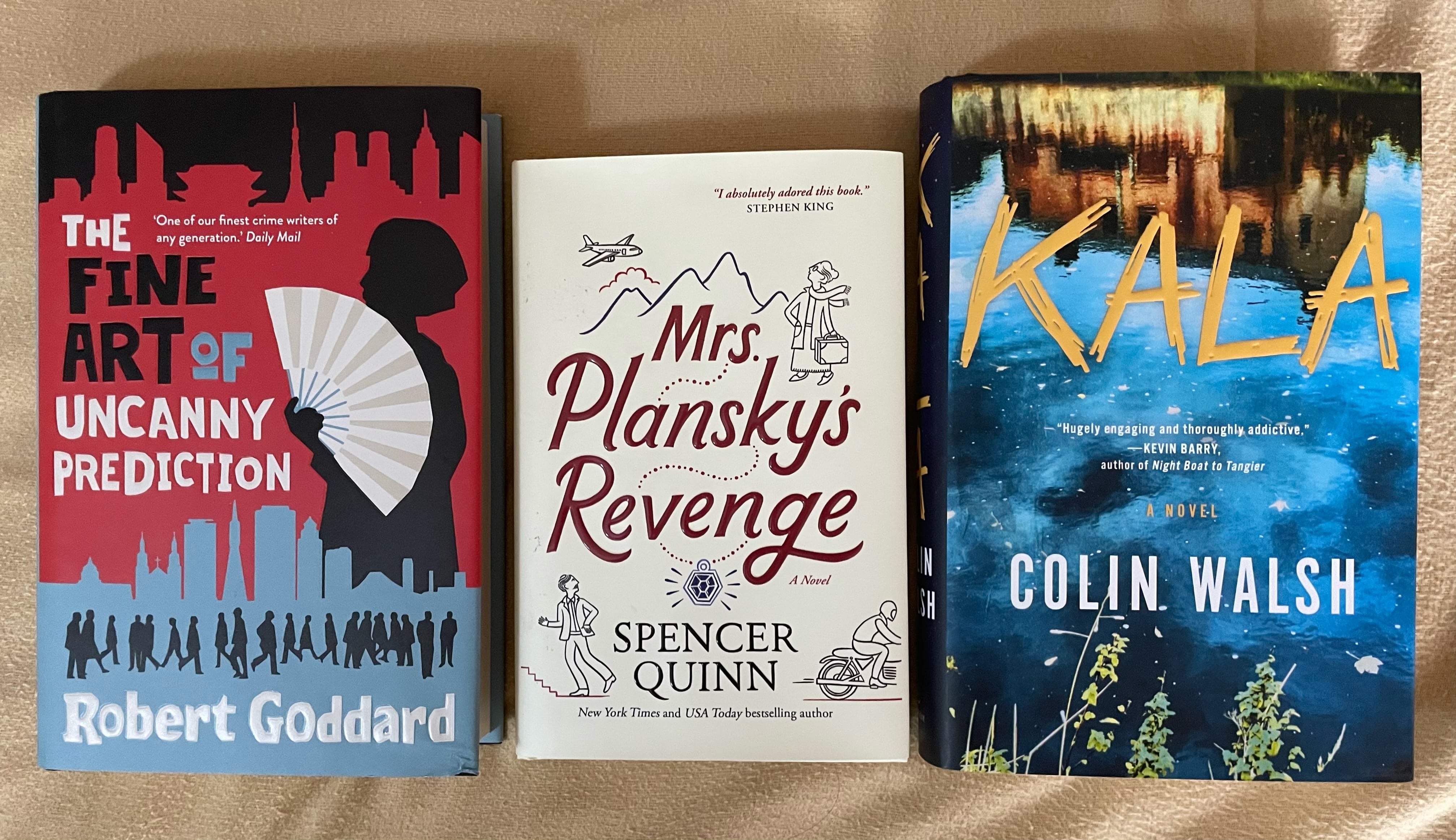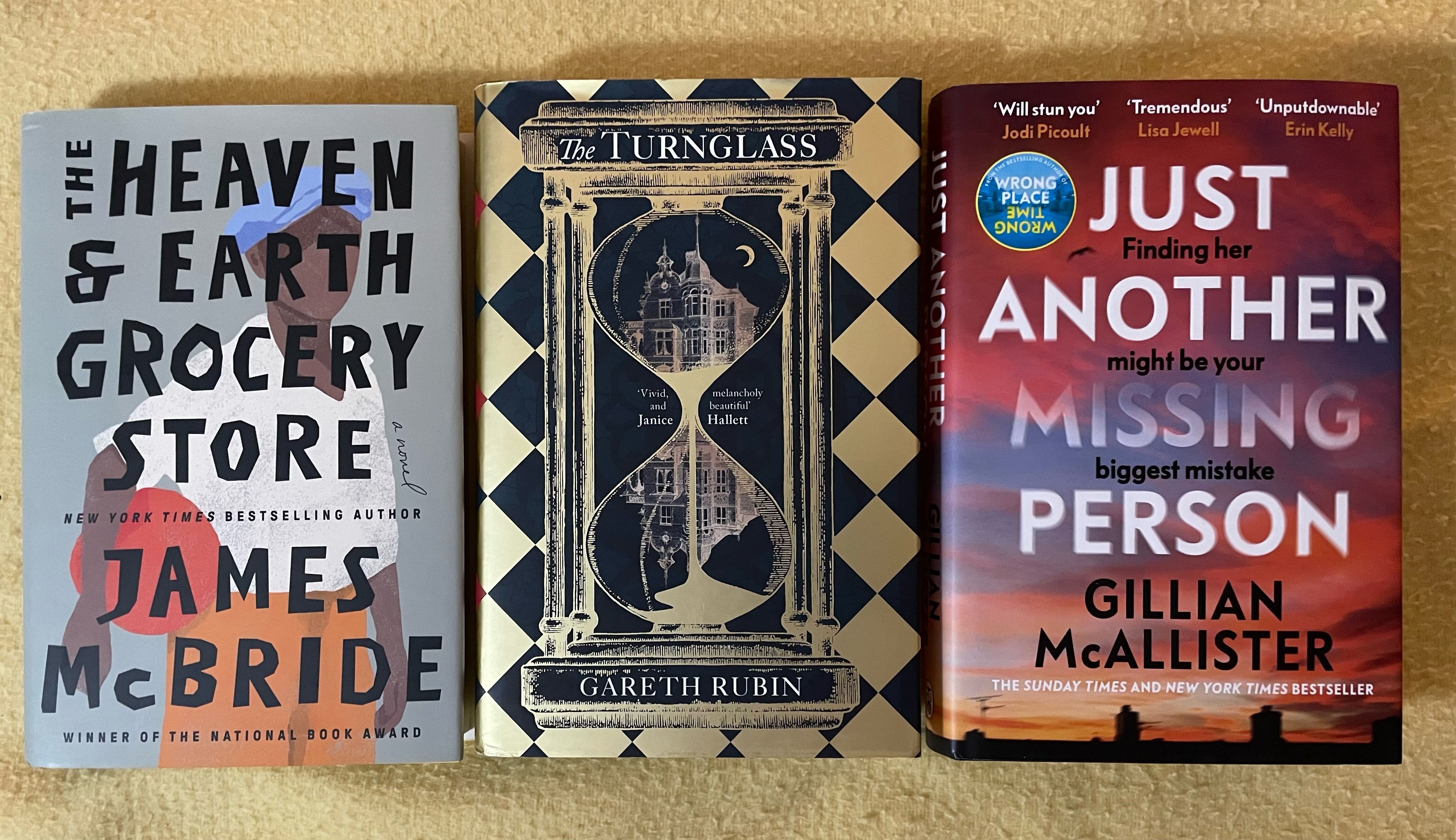IYCRMM: Crime and mystery as potent human drama
Book reviews on "Kala," "Mrs. Plansky's Revenge," "The Fine Art of Uncanny Prediction," "The Heaven and Earth Grocery Store," "The Turnglass," and "Just Another Missing Person"
These six novels would be categorized as Crime Fiction or Mystery Thrillers, but they also provide human drama (and comedy) in big doses.

Kala by Colin Walsh
Set on the west coast of Ireland, this novel serves as both a reverie of growing up and a reflection on days gone by. It also exposes the underbelly of rural small towns. When the novel begins, we come to understand that Helen and Joe have made a grand return to Kinlough, while Mush never left. Along with Aidan, Aoife, and Kala, the six of them were inseparable back in 2003, with Kala as the tempestuous center of the gang. However, Kala suddenly disappeared without a trace in 2003. It's only in 2018 that the remains of a person believed to be Kala have been found in the woods. Joe pursued a career as a rock star with his band Jungle Heart, while Helen turned to journalism in Canada, and Mush works in the local cafe with his mother.
This intriguing and disarming narrative shifts points of view and time frames, offering perspectives from Helen, Joe, and Mush. Slowly, they piece together what happened and why. Small-town intrigues, the impact of one's family lineage on their life choices, and the idea that decisions made are often irreversible are the cornerstones of this unfolding mystery. It's a mystery that reveals that even in small towns like Kinlough, there's something amiss. For a debut novel, Walsh demonstrates undeniable polish and maturity, making him someone to watch. The story is expertly plotted, akin to peeling an apple, offering much to savor and enjoy.
Mrs. Plansky’s Revenge by Spencer Quinn
Meet your action hero with a hip replacement: Loretta Plansky, a woman in her seventies, recently widowed, living in Florida, where she and her late husband, Norm, retired. Her ninety-year-old father is still kicking, causing his own share of trouble in the high-rise retirement home where he resides. Amid Loretta's children and grandchildren, she falls victim to an online scam by someone posing as her grandson, Will. The scammer gains access to her accounts and drains her financially. Overcome with embarrassment about her gullibility and how easily she was fooled, she decides to take matters into her own hands and investigate. Her search leads her to a small Romanian town where the scammers are operating. Determined to restore her dignity and seek some form of revenge, she boards a plane to Romania.
You might wonder if a seventy-year-old avenging angel can make a significant impact, but Loretta is not to be underestimated. In no time at all (requiring a bit of suspension of disbelief), she crosses paths with the two young boys who work for the crime boss of the Romanian town. These boys impersonated Will and handled the technical aspects of the scam. Dealing with the crime boss himself and his menacing henchmen requires another leap of suspension, but there's no denying Loretta's appeal. Her gumption, vulnerability, and determination combine to make her a memorable heroine. While this story fits into the growing trend of senior citizen protagonists, Quinn ensures that Loretta makes a compelling case for herself.
The Fine Art of Uncanny Prediction by Robert Goddard
Four years ago, 'The Fine Art of Invisible Detection' introduced us to Umiko Wada, a middle-aged and widowed secretary to Kazuto Kodaka, who ran his own detective agency in Tokyo. The untimely death of Kazuto pushed Wada to take on the mantle, and she became a delightful creation by Goddard. After a stand-alone novel set in South America, Goddard returns to Japan with a story that spans some seventy years and brings Wada back into the proverbial spotlight. We are thankful for this, as Wada is a unique character in the world of crime fiction, almost as unique as Goddard himself, a recipient of the Diamond Dagger, the highest accolade given by the Crime Writers Association for lifetime achievement.
As a master of double-cross plotting and layering multi-strand narratives, Goddard showcases his established prowess in this novel. It opens with a criminal act in 1945, and then we shift between 1995, with Kazuto pursuing a case, and Wada in 2022, investigating the disappearance of a businessman's estranged son. Wada soon discovers more than casual connections to what transpired with Kazuto in 1995 and even back in 1945. The secrets, the stories, and the persistence of criminal activity by a despicable 'father of industry,' as well as the extent to which he'll use his secrets for personal gain over decades, all play pivotal roles in the shifting narratives of this complex thriller. Welcome back, Wada!

The Heaven and Earth Grocery Store by James McBride
From the celebrated author of 'The Good Lord Bird' and 'Deacon King Kong' comes his latest novel, another sympathetic and profound exploration of the historic Black experience. While 'The Good Lord Bird' delved into the early abolitionists and 'Deacon King Kong' tackled life in the Brooklyn projects of the 1960s, 'Grocery Store' spans over 50 years in the life of Chicken Hill, Pottstown, Pennsylvania. It serves as a snapshot of small-town USA and how Jews and African-Americans coexisted side-by-side.
In 1972, while excavating the foundation for a new housing project, workers discover a human skeleton. The narrative then takes us back in time to unravel the mysteries surrounding the identity of the skeleton and the reasons for its burial.
As with all of McBride's novels, 'Grocery Store' delves into the human drama, focusing on how bigotry, hypocrisy, and deceit permeate communities and society as a whole. The characters are vividly portrayed. Moshe and Chona Ludlow run the titular store, with Chona being an irrepressible woman who is color-blind. Nate Timblin, a black worker for Moshe at the theater he manages, persuades Moshe to expand and book black acts. On the other side of the spectrum is Doc Roberts, the local doctor who participates in the Klan parade every year. Despite wearing a hood, his limp and girth make him unmistakable. At the center of the controversy is a twelve-year-old black boy believed to be deaf and mute but is, in fact, the victim of a tragic accident. McBride, a National Book Award winner, continues to captivate readers with his storytelling prowess."
The Turnglass by Gareth Rubin
Here's a writing curiosity: a Tête-bêche novel, where you essentially have two stories in one book. These stories are written as inversions, like head to foot, and each has its own cover. The unique aspect is that you're free to choose which 'novel' to read first. By the very end, you'll discover how each story informs the other while also standing independently apart.
One of the stories, 'Turnglass,' is a gothic tale set on an island off Essex in the 1880s. It follows young doctor Simeon Lee, who arrives to minister to his distant relative, Parson Hawes. The parson's sister-in-law, Florence, is believed to be responsible for her husband's death and is confined to a glass-walled room in the library. Hawes claims that Florence is somehow poisoning him.
In the other story, set in 1930s California, young author Oliver Tooke is found dead, but his aspiring actor friend, Ken, is not convinced that it was a suicide. Oliver's father is a California Governor, and his grandfather, originally from England, is named Simon. They live in a glass mansion overlooking the Pacific Ocean. Coraline, Oliver's sister, joins Ken in investigating the circumstances surrounding Oliver's death. Their journey even takes them to the ancestral home of the Tookes in Essex, England. The metaphor of the turnglass (hourglass) and its inversion, symbolizing time running out, is prevalent throughout both stories.
While some may find the parallel elements manipulative, others will be charmed by them. Count me among the latter category.
Just Another Missing Person by Gillian McAllister
McAllister, the author of the deviously plotted bestseller 'Wrong Place Wrong Time' from last year, is a favorite on both sides of the Atlantic. This crime novel was written in reverse, much like a mother attempting to change the outcome of the first chapter.
In her latest work, the story begins with the inexplicable disappearance of Olivia, a 22-year-old, who is captured on Portishead CCTV entering a dead-end alleyway and never reemerging. We are then introduced to DCI Julia, who leads the investigation but is coerced into planting evidence to frame a specific young man. The narrative unfolds through shifting points of view, including Julia's, Olivia's 'father' Lewis, and Emma, the mother of the young man being framed.
Genevieve, Julia's daughter, also plays a crucial role in the story, revealing dark motives and secrets that continuously wrongfoot the readers. McAllister skillfully leads us down unexpected paths, creating a metaphorical rabbit hole where Julia finds herself trapped. Another missing girl case from a year ago, that of Sadie, resurfaces, with Julia having led the investigation that ultimately went unresolved. The culpability she may bear for the unresolved case haunts her, adding a significant layer of complexity to the narrative.
McAllister knows how to surprise her readers, leading them down one path only to upend expectations. In this new novel, she once again delivers these delightful twists and turns.